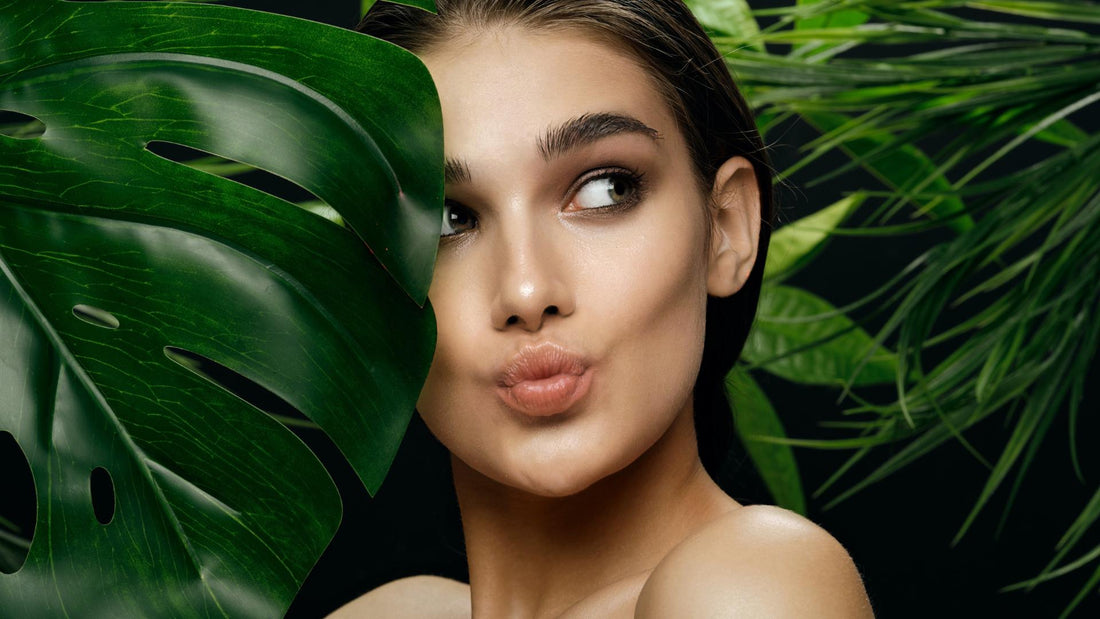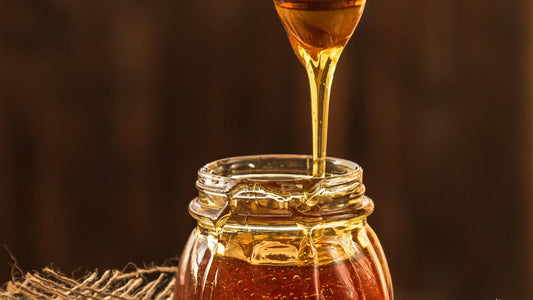
Essential Oils for Beautiful Skin: Unlocking the Secrets to Radiance
Share
In the pursuit of natural skincare, more and more individuals are turning to these precious oils cherished for their holistic skincare properties. In this guide, we explore their profound impact, from addressing common skincare concerns to supporting overall skin well-being. Join us as we uncover the secrets to nurturing and enhancing healthy skin with essential oils.
The Origins of Essential Oils
Essential oils are intriguing natural substances derived from plants, capturing both their aromatic essence and potential healing qualities. This time-honoured practice, dating back to ancient civilizations such as the Egyptians, Greeks, and Romans, continues to offer a pathway to holistic wellness and enhanced natural beauty. Essential oils can be particularly fascinating if you aspire to embrace a more natural and sustainable lifestyle.

Every essential oil possesses a unique chemical composition, resulting in its distinctive aroma and a wide range of therapeutic benefits. Brimming with vitamins, antioxidants, and essential fatty acids, these oils are natural powerhouses, capable of rejuvenating and nourishing your skin.
To fully appreciate their potential, let's delve into their multifaceted applications for those seeking a more natural way of life.
Harness the Power of Essential Oils
Incorporate diluted tea tree oil into your skincare and haircare regimen, helping you achieve clear skin, a healthy scalp, and a refreshing feeling. From spot treatments to soothing foot soaks, discover how to harness the power of essential oils for a naturally radiant you:
- Dilution: Tea tree oil should always be diluted with a carrier oil, such as coconut or jojoba oil, before being applied to the skin. A typical dilution ratio is 2-3 drops of essential oil to 1 tablespoon of carrier oil.
- Spot Treatment: Dab a small amount of diluted tea tree oil onto blemishes or troubled skin areas to help clear them.
- Shampoo and Conditioner: Add a few drops of tea tree oil to your shampoo and conditioner to support scalp health and maintain a fresh, clean feeling.
- Foot Soak: Create a refreshing foot soak by adding a few drops of tea tree oil to a basin of warm water. It can help alleviate foot odour and fungal issues.
Top 7 Essential Oils for Beautiful and Healthy Skin
Achieving beautiful skin begins with addressing common skincare issues. Essential Oils effectively target these concerns, promoting radiant skin.
Some Essential Oils have gained a reputation for their skincare benefits:
1. Tea Tree Essential Oil
Tea tree essential oil, derived from the leaves of the tea tree (Melaleuca alternifolia), is a robust and versatile oil with a fresh, medicinal scent. Furthermore, this oil celebrates its potent antimicrobial and anti-inflammatory properties, making it a staple in many natural wellness routines. We really like this essential oil from Aroma Manufaktur.

Benefits:
- Skin Saver: Tea tree oil is a renowned skin saviour known for its ability to combat acne and blemishes. It has natural antibacterial properties that help clear and also purify the skin.
- Soothing Irritations: The anti-inflammatory properties of tea tree oil can provide relief from skin irritations, redness, and itching.
- Hair and Scalp Health: People often use it to maintain a healthy scalp and address issues like dandruff, thanks to its cleansing as well as clarifying effects.
How to Use:
- Skin Spot Treatment: Harness the power of tea tree oil by diluting 2-3 drops with a carrier oil like jojoba or almond oil, creating a potent spot treatment for blemishes and imperfections on your skin.
- Clarifying Face Mask: Combine a few drops of diluted tea tree oil with a natural clay mask for a revitalizing and clarifying skincare ritual. This mask can help absorb excess oil and impurities, leaving your skin refreshed.
- DIY Body Scrub: Elevate your self-care routine by adding a few drops of tea tree oil to a homemade body scrub and mixing it with ingredients like sugar or sea salt. This not only exfoliates your skin but also introduces the refreshing benefits of tea tree oil for an invigorating experience.
2. Lemon Essential Oil
Lemon essential oil, extracted from the rind of fresh lemons, is a versatile and invigorating oil with numerous applications for both health and well-being. Its zesty, citrus scent is uplifting and refreshing, making it a favourite among essential oils.

Benefits:
- Cleansing and Purifying: People praise lemon oil for its cleansing properties, both for the skin and the surrounding environment. It can help in addressing oily skin, acne, and blemishes.
- Uplifting Aroma: The bright and zesty aroma of lemon oil can elevate your mood and promote a sense of freshness and clarity.
- Supports Immunity: Lemon oil is rich in antioxidants and vitamin C, which can support the body's natural defences.
How to Use:
- Dilution: You can use lemon oil topically when you properly dilute it with a carrier oil, such as jojoba or almond oil. A common dilution ratio is 2-3 drops of essential oil to 1 tablespoon of carrier oil.
- Face Toner: Mix a few drops of diluted lemon oil with water to create a natural facial toner. It can help balance oil production and promote a clearer complexion.
- Aromatherapy: Diffusing lemon oil in a diffuser can freshen the air and uplift your mood. It's especially beneficial during moments of stress or fatigue.
3. Peppermint Essential Oil
Peppermint essential oil derives from the leaves of the peppermint plant and people cherish it especially for its cooling and invigorating properties. It has a menthol-like scent that awakens the senses and offers a wide range of applications.

Benefits:
- Cooling Sensation: Peppermint oil provides a cooling effect when applied topically, making it suitable for soothing sore muscles, headaches, and tension.
- Digestive Aid: When you properly dilute peppermint oil, you can use it to support digestion and relieve symptoms of indigestion and nausea.
- Mental Clarity: The invigorating scent of peppermint oil can help increase alertness, focus, and mental clarity.
How to Use:
- Dilution: You should dilute peppermint oil with a carrier oil, such as coconut or olive oil, before applying it to the skin. A common dilution ratio is 2-3 drops of essential oil to 1 tablespoon of carrier oil.
- Massage Oil: Mix diluted peppermint oil with a carrier oil for a refreshing and invigorating massage oil. It's especially useful for relieving muscle tension.
- Inhalation: Inhaling the aroma of peppermint oil directly from the bottle or by diffusing it can help alleviate symptoms of congestion and boost mental alertness.
4. Geranium Oil
Geranium essential oil, derived from the Pelargonium graveolens plant, is a versatile and fragrant oil with numerous benefits for the skin. It's especially known for its ability to balance the skin's sebum production, which makes it suitable for both oily and dry skin types.

Benefits:
- Balancing and Toning: Geranium oil helps balance the skin's natural oils, making it an excellent choice for maintaining healthy skin texture.
- Anti-Ageing: It can reduce the appearance of fine lines and wrinkles, further promoting a more youthful complexion.
- Anti-Inflammatory: Geranium oil has anti-inflammatory properties, making it useful for soothing redness and irritation.
How to Use:
- Dilution: Always dilute geranium oil with a carrier oil, such as jojoba, coconut, or almond oil, before applying it to the skin. A common ratio is 2-3 drops of essential oil to 1 tablespoon of carrier oil.
- Face Serum: Add a few drops of diluted geranium oil to your regular face serum or moisturizer to promote skin balance and reduce the signs of ageing.
- Aromatherapy: You can also use geranium oil in aromatherapy by adding a few drops to a diffuser or a bowl of hot water to enjoy its soothing aroma.
5. Ylang-Ylang Oil
Ylang-ylang essential oil derives from the Cananga odorata flower and is renowned for its rich, sweet, and floral scent. Besides its benefits for the skin, ylang-ylang oil is widely used in aromatherapy.

Benefits:
- Skin Health: Ylang-ylang oil promotes skin health and can help maintain a balanced complexion.
- Anti-Aging: It has properties that may reduce the appearance of fine lines and wrinkles.
- Mood Enhancement: Additionally, ylang-ylang's delightful aroma can promote relaxation and reduce stress, which in turn benefits skin health.
How to Use:
- Dilution: Similar to other essential oils, you should dilute ylang-ylang with a carrier oil before applying it to the skin. The recommended dilution is 2-3 drops of essential oil per tablespoon of carrier oil.
- Facial Massage Oil: Mix a few drops of ylang-ylang oil with a carrier oil and use it for a relaxing facial massage. In particular, this is very beneficial in improving skin texture and reducing tension.
- Bath soak: Add a few drops to a warm bath for a relaxing and aromatic soak. This can be soothing for both the skin and the mind.
6. Lavender Essential Oil
Lavender essential oil, extracted from the Lavandula angustifolia plant, is one of the most beloved and versatile essential oils. Its sweet, floral aroma is not only pleasant but also offers a wide range of benefits for both body and mind.

Benefits:
- Calming and Soothing: Lavender oil is well-known for its calming and relaxing properties. It can help reduce stress and anxiety as well as promote better sleep.
- Skin Nourishment: It also has skin-nourishing properties that are ideal for soothing skin irritations, redness, and minor burns.
- Hair Care: People use lavender oil to support hair health, provide shine, and promote a healthy scalp.
How to Use:
- Dilution: Typically, people apply lavender oil topically, but they should dilute it with a carrier oil like jojoba or almond oil. A common dilution ratio is 2-3 drops of essential oil to 1 tablespoon of carrier oil.
- Aromatherapy: Diffusing lavender oil can create a calming and serene atmosphere, ideal for relaxation and improved sleep.
- Linen Spray: Create a soothing linen spray by diluting lavender oil with water and lightly spritzing it on your pillows and sheets.
7. Rose Essential Oil
Rose essential oil, derived from the petals of Rosa damascena or Rosa centifolia, is a luxurious and aromatic oil with a rich, floral scent. People treasure it for its beauty-enhancing and emotionally uplifting qualities.

Benefits:
- Skin Elixir: People know rose oil for its ability to promote healthy as well as radiant skin. It can help maintain skin's moisture and reduce the signs of ageing.
- Emotional Wellness: In aromatherapy, people use the exquisite aroma of rose oil to boost mood, reduce stress, and increase feelings of well-being.
- Properties: Rose oil is known for its antiseptic, bactericidal and anti-inflammatory properties. Therefore, it can be a very valuable assistant in cases of inflammation and irritation, including allergic rashes and eczema.
How to Use:
- Dilution: When using rose essential oil on the skin, you should dilute it with a carrier oil. A typical dilution ratio is 2-3 drops of essential oil to 1 tablespoon of carrier oil.
- Perfume: Create your own natural and floral perfume by diluting rose oil with carrier oil and applying it to pulse points.
- Aromatherapy: Diffuse rose oil to enjoy its calming and mood-lifting effects. It's particularly useful during times of stress or emotional fatigue.

Lola is the founder of Green Cloud Nine. Nature lover and environmental activist since she was a teenager, Lola has always been a great fan of homesteading. She is continuously experimenting and finding ways to be more self-sufficient and sustainable.




